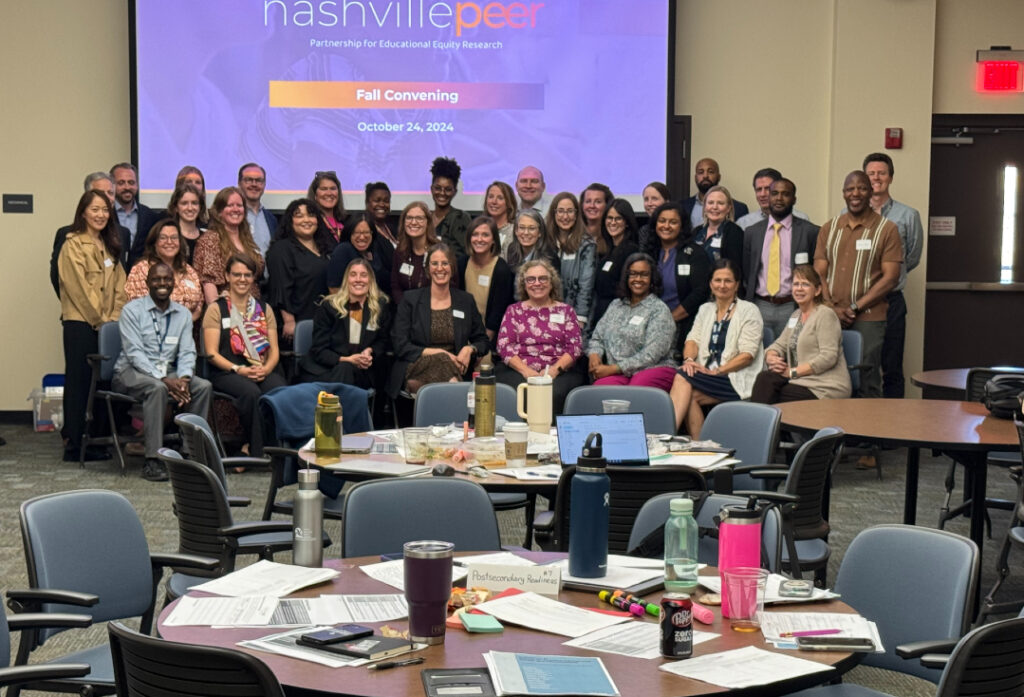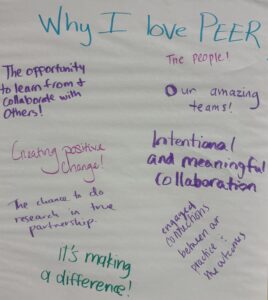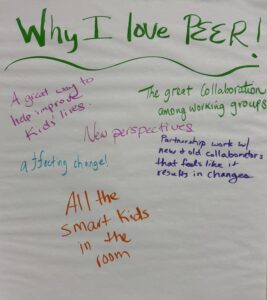Engage with Us
We want you to learn more about what we do and why we do it. We invite you to sign up to receive updates to learn how you be part of our work.

In Fall 2024, members from all of NashvillePeer’s cross-institutional working groups and rapid response study teams came together to learn and collaborate with one another and action plan for the upcoming year and beyond. Focusing on both short and long-term impacts, each group spent time workshopping how they can best design their studies and position their findings through strategic engagement with key MNPS constituents to create positive, evidence-based changes in the district and in schools. Team members reviewed MNPS’s “theory of action” for the current school year, growing their understanding of how MNPS seeks to improve outcomes at scale across all schools, and reflected on how our approach to research may continue to evolve to support this work. In addition to the working group members, many MNPS Chiefs were in attendance to learn alongside the research teams.
The anchor of each team’s action planning began with crafting impact statements – or vision statements that reflect the ultimate impact each research team hopes to have through engaging in partnership research within their priority area.
Postsecondary Readiness Working Group
The Postsecondary Readiness Working Group works across two different teams – one that analyzes longitudinal MNPS data to understand trends in EPSO participation, completion, and success, and another that works directly with three partner high schools to co-design and test interventions for improving student access and participation in EPSOs.
Through both research strands, the partners in these groups hope to:
Student Absenteeism Working Group
Reducing chronic absenteeism rates across the district by achieving a systematic understanding of barriers to attendance for students and implementation challenges for schools.
Youth Success & Wellbeing Working Group
Articulate a framework for aligned and jointly accountable city-wide systems that ensure better outcomes for all students and make recommendations about what is and isn’t working within the current systems.
Supporting Educators Working Group
Improve student outcomes and reduce variability in teacher practice in mathematics through coherent and effective instructional supports and leadership practices.
Tiered Interventions Rapid Response Team
Maximize the effects of MNPS’ tiered intervention programs to accelerate student growth across the district.
Research conducted through NashvillePeer is unique because members of working groups and rapid response teams collaboratively engage and are intentionally supported throughout a research cycle that includes four phases: 1) identify specific problems of practice, 2) develop research questions and design studies, 3) conduct research and make sense of findings, and 4) develop recommendations for policy and practice. Research findings are then distributed through briefs on the NashvillePeer website, at Cabinet study sessions where teams present to MNPS leadership and at sponsored events. Findings are also used to engage in co-design research with schools to ensure the work is impactful.
Over the next year, the research teams will work to meaningfully engage all constituent groups—students, teachers, administrators, counselors, district leaders, community members, and families– at different points in the research process and in ways that they hope will lead to greater take up of their findings and lasting changes that make real differences for kids across the district.


We want you to learn more about what we do and why we do it. We invite you to sign up to receive updates to learn how you be part of our work.